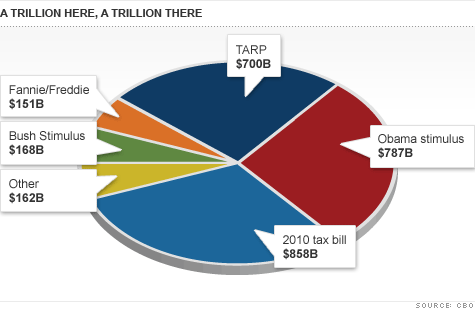Search News

NEW YORK (CNNMoney.com) -- Since the recession began three years ago, Congress has poured a total of $2.8 trillion into the economy in an effort to spur hiring, get people spending again and prop up industries struggling to stay afloat.
While the $858 billion package of tax cuts passed last week was the biggest slice of stimulus yet, it accounts for less than a third of all the money spent since the start of 2008, according to multiple cost estimates prepared by the nonpartisan Congressional Budget Office over the last three years.
The rest came from a combination of the $700 billion Troubled Asset Relief Program, the $787 billion stimulus bill passed in the early days of the Obama administration, and various smaller stimulus programs.
Tax cuts represented the largest spigot opened in an attempt to get cash flowing into the economy. About $1.3 billion, or 47% of the money spent, came from reducing taxes for individuals and businesses.
That started with the $168 billion stimulus package approved in early 2008 and signed by President Bush, and ended with the deal between President Obama and Congressional Republicans that was signed into law last week.
Bailouts, primarily of troubled businesses, were clearly the most controversial part of the turnaround efforts. That was the second biggest recipient of Congressional largess, with about $851 billion of the money going to rescue efforts.
The efforts were led by the $700 billion approved for the Troubled Asset Relief Program, which bailed out the nation's major banks and Wall Street firms, financed General Motors' (GM) and Chrysler Group's trips through bankruptcy and helped homeowners modify mortgages they could no longer afford.
The rest of the bailout spending came from the virtual blank check that Congress gave Treasury to prop up mortgage finance giants Fannie Mae and Freddie Mac. The money given to those firms stands at $151 billion -- and counting.
Public works projects like road and school repair or efforts to develop clean energy and high speed rail, along with help for state and local governments, was a relatively small part of the total stimulus -- just over $250 billion, or about 9% of the spending, most of it found in the stimulus act passed at the start of the Obama administration.
Direct help to the unemployed, which a study by the CBO estimates is one of the most efficient ways to help the economy because the money is spent so quickly, accounted for about $165 billion of the spending, or about 6% of the help approved by Congress.
Some of the highest-profile efforts that put money directly into the pockets of consumers -- such as Cash for Clunkers and the homebuyer tax credit -- were actually a tiny sliver of the stimulus pie, each accounting for less than 1% of total money spent. ![]()






| Index | Last | Change | % Change |
|---|---|---|---|
| Dow | 32,627.97 | -234.33 | -0.71% |
| Nasdaq | 13,215.24 | 99.07 | 0.76% |
| S&P 500 | 3,913.10 | -2.36 | -0.06% |
| Treasuries | 1.73 | 0.00 | 0.12% |
| Company | Price | Change | % Change |
|---|---|---|---|
| Ford Motor Co | 8.29 | 0.05 | 0.61% |
| Advanced Micro Devic... | 54.59 | 0.70 | 1.30% |
| Cisco Systems Inc | 47.49 | -2.44 | -4.89% |
| General Electric Co | 13.00 | -0.16 | -1.22% |
| Kraft Heinz Co | 27.84 | -2.20 | -7.32% |
|
Bankrupt toy retailer tells bankruptcy court it is looking at possibly reviving the Toys 'R' Us and Babies 'R' Us brands. More |
Land O'Lakes CEO Beth Ford charts her career path, from her first job to becoming the first openly gay CEO at a Fortune 500 company in an interview with CNN's Boss Files. More |
Honda and General Motors are creating a new generation of fully autonomous vehicles. More |
In 1998, Ntsiki Biyela won a scholarship to study wine making. Now she's about to launch her own brand. More |
Whether you hedge inflation or look for a return that outpaces inflation, here's how to prepare. More |